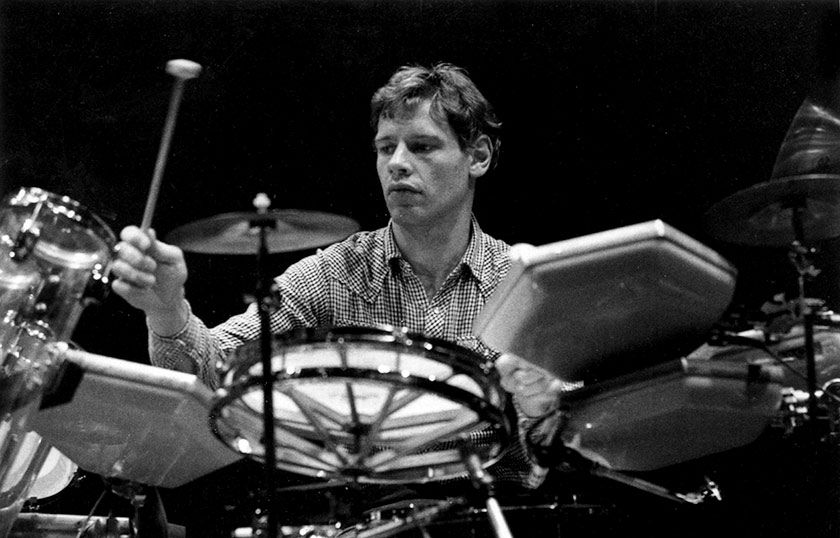
Bill Bruford, Prog Drummer
Among some of the greatest drummers of all time is the great Bill Bruford, who mostly made his name known due to his work in the progressive rock world, playing with some of the most important bands of the genre such as Yes, King Crimson and Genesis.
However Bill’s beginning as a drummer was not playing rock, it was as a jazz drummer. He took some lessons from Lou Pocock and after that went on to pursue this new movement which was called “Art Rock”.
In an interview, when asked about his jazz influence during the time he played with Yes, he said:
I knew no other way to play the drums; there wasn’t a choice here. I had no experience of hitting a drum any harder; I had no experience of what it might be like to be a Texan rhythm & blues drummer, so we are all just a mixture of whatever had been on our record players. And we loved it all, and I loved it all, and I pushed together everything I thought was of interest, and I didn’t realize it had to go a particular way; everything felt completely open. I felt I could do anything I wanted, really, on drums.
rollingstone.com

Even though he made Yes and King Crimson shine through his skill as a drummer, Bill never felt like staying with a band, in a way, he always wanted to pursue new different things, and so he did by playing with many different bands, until he learned enough to pursue his own thing.
After playing with King Crimson in the 80s, Bruford finally felt like forming his own band called Earthworks, which was one of the best jazz bands in 1987.
Retirement and Studies
After many years of playing with many bands, collaborating with many artists and forming his own succesful band, the famous drummer took a different approach towards music and creativity.
In 2009 Bill Bruford retired from performing and recording in order to focus on investigations regarding creativity and psychology. He got his PhD in 2016 and now focuses on writing books, articles and giving lectures at various universities.
It all started with Bruford taking a step back from the performer side of things and actually thinking about the creative process and how it works.
Everything changed to some degree or another in my 41 years, including a love of music-making that diminished very gradually over time. I’m not sure my conceptualization of groove sees it as something I possess so much as something I create and share with others. I am thus unable to assign it an “identity”. However, the performer might choose to construct an identity which he or she quickly learns to sublimate or project as the music situation demands.
pienemmatpurot.com
When asked about playing the drums, even if it is just for fun, he said:
Walking from my desk to the kitchen I have to walk past a drum kit on one side and a piano on the other. They look at me rather balefully, I think: “Not even a C major 7th today, guvnor?” says the piano. “Go on; just a couple of ratamacues for old times’ sake,” hum the drums. Occasionally I accede, and they seem pleased, but my heart is not in it. My interests lie elsewhere now and our relationship has cooled. I had ardour aplenty for the first thirty years, somewhat less for the next ten, until the fire smouldered to embers and went out. It all seems perfectly natural to me.
medium.com
